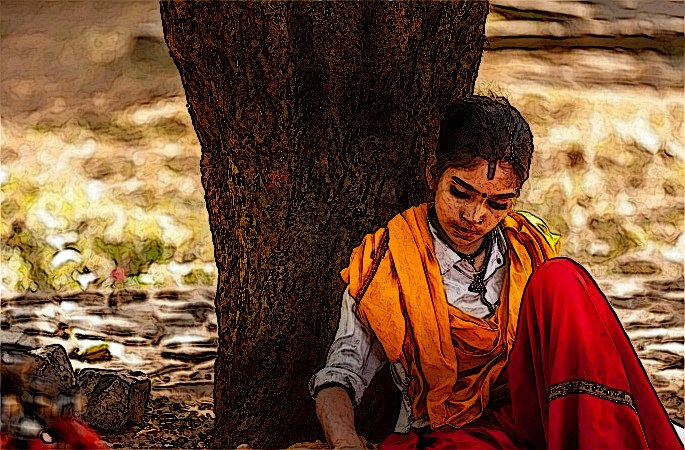On 15th July 2021, a sixteen-year-old girl named Hishalini succumbed to severe burn injuries after being admitted to Colombo National Hospital. She was employed as a domestic worker at the time of the incident.
The employer said that she died by suicide, but the victim’s parents claimed that she was burnt alive by the employer. The case is still under investigation. Hishalini is not the first underage domestic worker in Sri Lanka who died mysteriously. Hishalini’s case came into the limelight due to the protests conducted by different volunteer groups against the alleged perpetrators, who are the close relatives of a Member of Parliament.
According to a recent study by the International Labour Organization (ILO) Country Office for Sri Lanka and the Maldives, there are about 80,000 domestic workers in the country. Over 60,000 of these workers are women[1]. It is also a known fact that the Up-country Tamil minorities represent the highest proportion among these 60,000 workers. Thousands of women and girls from the Up-country Tamil minority community in Sri Lanka are sent to urban areas as domestic workers mainly due to the higher level of poverty in the community.
According to the Department of Census and Statistics of Sri Lanka, the multidimensional poverty index among Up-country Tamils is 9.81%, while it is only 5.41% in the rural population in Sri Lanka[2]. The urban elites also seek female domestic workers from this particular community because they can get cheap labour. Sri Lanka’s minimum wage rate is Rs. 10,000/= Sri Lankan Rupees per month. However, there is no evidence that domestic workers are paid a minimum wage or more due to the lack of proper employment contracts between employees and employers. The wage is decided by the employer solely, and there is no bargaining power for the employees.
Article 7 of the ILO Domestic Workers Convention, 2011 clearly states the terms and conditions of the employment contract should be spelt out in a verifiable and easily understandable manner, and the employee should be informed about it [3]. But this is non-existent on the ground level. Recommendations to the Convention also noted that domestic workers are neither “servants”, nor ‘members of the family’, nor second-class workers. The reported cases of violence against domestic workers show that they have been treated as ‘slaves.
There is no specific law in Sri Lanka that deals with domestic workers. As mentioned earlier, the majority of domestic workers in Sri Lanka represent Up-country Tamils.
However, due to the lack of pressure from politicians, organisations and activists representing the community, the Government has been slow to take relevant action. Nevertheless, the Government has taken some action to protect domestic workers in the last couple of years. In March 2018, the Cabinet approved the National Action Plan for the Promotion and Protection of Human Rights (NHRAP 2017-2021). Goal number 7 under the women’s rights section is on the rights of domestic workers. Further, the Cabinet has also approved the inclusion of ‘domestic worker’ in the definition of worker in the Industrial Disputes Act and the Employees’ Provident Fund and Employees’ Trust Fund Acts.
At present, few civil society organisations are working to address this issue. They have conducted research studies on the issues faced by female domestic workers in Sri Lanka. But the larger women’s movement is silent on this issue due to various reasons. When Hishalini’s case appeared in the mainstream media, only a handful of civil society organisations attempted to send a petition to the Government and engaged in protest for justice for the victim and her family. Thus, the women’s movement in Sri Lanka has failed to take tangible action to address the issue faced by female domestic workers within the country.
The first-ever trade union for domestic workers in Sri Lanka was registered in March 2012 with the aim to strengthen the union by making workers aware of their rights and discriminations, empowering them to act against the violations and creating collective leadership. The union was successful in getting approximately 1300 members so far[4]. However, this number is comparatively small in relation to the overall statistics of domestic workers in Sri Lanka. It also should be noted that it is impossible to mobilise all domestic workers under one union within a short span of time. Therefore, support from other stakeholders is inevitable to mobilise domestic workers under one umbrella.
In order to protect thousands of Hishalinis, the Sri Lankan government should ratify the ILO Convention 189 on domestic workers and make necessary national laws to protect domestic workers. The new laws should also clearly state that it is an offence to recruit children under any condition. Further, the existing labour laws should be implemented effectively. The perpetrators should be held accountable in the case of Hishalini without any political influence. Building confidence and trust in the Sri Lankan legal system is necessary among the trade unions, civil society organisations, activists, volunteer lawyers who appeared for Hishalini’s case and the youth who protested amidst COVID-19 restrictions.
[1] International Labour Organization in Sri Lanka, Domestic Workers and Decent work in Sri Lanka, 2000. ILO office, Colombo. ILO Country Office for Sri Lanka and the Maldives
[2] http://www.statistics.gov.lk/Poverty/StaticalInformation/GlobalMultidimensionalPovertyforSriLanka
[3] https://www.ilo.org/dyn/normlex/en/f?p=NORMLEXPUB:12100:0::NO::P12100_ILO_CODE:C189
[4] https://idwfed.org/en/affiliates/asia-pacific/domestic-workers-union-sri-lanka



